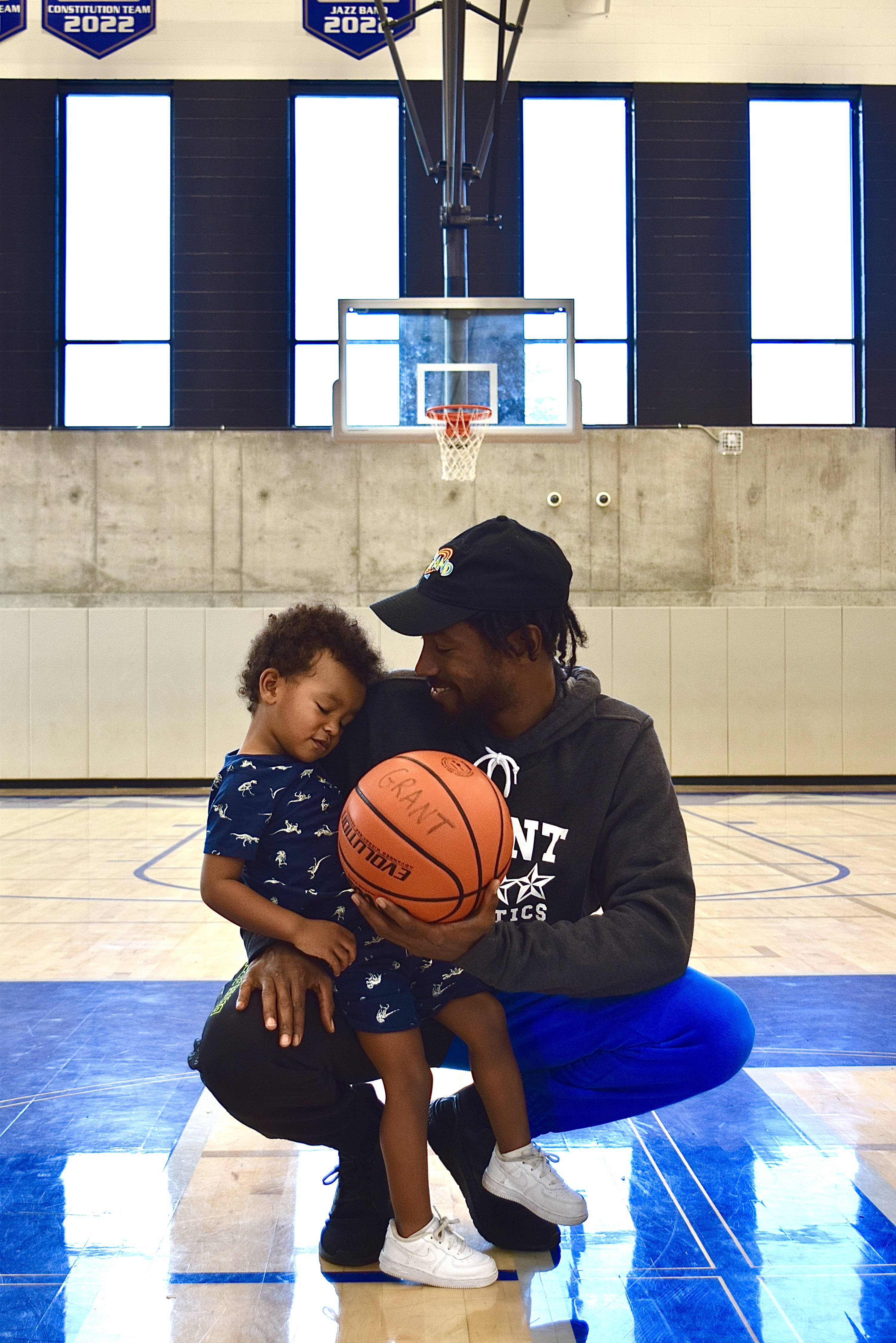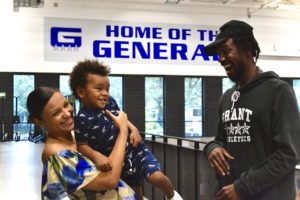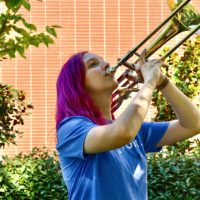
With nearly three decades of basketball experience, Dondrale Campbell joins the Grant athletic staff ready to fill big shoes as the new Head Boys Basketball Coach.
There is a buzzing, anticipatory energy in the bleachers as Cleveland High School and Grant High School match up for a high-stakes varsity basketball game. For either team, a win can almost guarantee a Portland Interscholastic League (PIL) season title.
As the game heats up, so do the stands, and the energy on the court electrifies. With less than two minutes on the clock, Cleveland player Christian Green gets the ball and goes for a dunk. “For me, that’s when the excitement hit,” says Dondrale Campbell, Cleveland’s Head Boys Basketball Coach at the time, “I started jumping up and down and getting excited with the crowd, knowing we were gonna win the game.”
When the buzzer sounds to signal the end of the game, Cleveland players and fans alike erupt into celebration. For the first time since 1962, Cleveland had earned a PIL title.
“After four years of working hard and hearing ‘Only Grant and (Jefferson High School) will win the league’ and ‘you can never (win) with that group of kids over there’ … it felt amazing,” says Campbell.
At the time, the coach had no idea he’d soon be hanging up his Warrior’s clipboard in exchange for that of the competitor’s.
Following the departure of long-time Grant High School coach Robert Key, two-time Portland Interscholastic League (PIL) Coach of the Year Campbell has joined the Grant athletic staff to take the job. Campbell brings with him a youthful, multi-faceted perspective and experience in both professional basketball and coaching. Grant sports fans are eager to see how the new hire drives this year’s varsity basketball lineup, and Campbell is ready to get started.
“I’m excited for this environment, the community, the sports atmosphere and the prestigiousness of Grant High School itself,” says Campbell. He adds, “Knowing what has come from the athletics here, I’m looking forward to being a part of that and hopefully adding to it.”
Born and raised in Oakland, California, Campbell started playing basketball before he even began kindergarten.
Initially, his interest in the game was sparked by watching his older brother play. “Any practices that (my brother) was doing in the backyard or in the front on our court, I was there,” he says.
Though his brother’s attention eventually shifted towards football, Campbell’s love for hooping stuck — and his skill development went to show for it.
As Campbell grew older, basketball became an outlet for him and a way to find community, which helped him establish his own personal trajectory.
“A lot of my friends had family members that did other things, whether it was drug-related or different jobs,” says Campbell, “For me, it was really just what I did to make myself different in order to set myself aside from those that I was directly around at a young age.”
He says, “If it wasn’t basketball, football or baseball, you were pretty much gonna get in trouble in my neighborhood.”
With ambitious feelings for his future, Campbell realized that keeping his focus zeroed in on basketball would set him on the right track.
He grew up in a single-parent home with his mom and brother, but was also mentored by the two men that coached him the most growing up: his God-dad and father. “For (my God-dad), it was 100% development,” says Campbell, “‘You make a mistake, Imma tell you about it, learn from it, do it again.’ That’s why I understand basketball as ‘you have fun, you do better,’ and ‘if you didn’t have fun, you usually lose.’”
“My god-dad showed me how to put in the work and how to be flexible, and my dad showed me how to be disciplined,” says Campbell. He recalls reminders his dad used to guide him with, like, “‘If you wanna be good, you gotta show up to practice on time,’ and ‘you wanna be a good leader, you gotta show up and lead by example.’”
At the end of Campbell’s freshman year at Oakland High School, he was barely maintaining a 2.0 grade point average (the lowest required to play basketball), but by the time he graduated, he had brought his discipline from the court to the classroom and earned honor roll status.
Campbell says, “My friends and family and teachers that I was involved with, they had seen something in me, and they pushed and challenged me, and they saw it was something that I took to.”
Such encouragement from important adults in his life pushed Campbell to look for ways to continue his basketball career after high school.
“Knowing that there were other players that were from where I was from and grew up like I did … my goals kind of changed in that I wanted to play overseas,” he says.
Campbell started his college career playing basketball at Monterey Peninsula College in California, and two years later, went on to play Division III basketball at Greenville University in Illinois.
Post-college graduation, Campbell spent more than a year and a half playing professionally, starting with three months on a semi-pro team in California. The stint was followed by another in Canada, and later, an opportunity to play with a tour team in China.
Eventually, Campbell’s friends and former teammates persuaded him to move to Portland, Oregon, where many of them had put roots down. He played a few games with a team in Salem, Oregon, but ultimately, the move to the northwest turned his focus towards coaching.
“As I moved up here and was working out, there were always other players that wanted to work out with me or wanted to know what I knew, so it was just kind of sharing,” says Campbell, “Knowing what my coaches did for my life and the impact they had on me and my friends … (coaching) always interested me.”
Subsequently, Campbell started picking up jobs with athletic programs and camps in the Portland area. This started with camps for Portland Trail Blazer Damian Lillard, a close friend of Campbell’s since their youth in Oakland.
Through these camps, Campbell started to meet coaches across the city that were seeking out helping hands in their athletic programs. This networking led him to coach freshman basketball at Lake Oswego High School, which he says “really started all of this.”
From there, Campbell was hired as the Head Boys Basketball Coach at Cleveland High School in Southeast Portland, which began his reign over the PIL.
During his first days on the job, Campbell began to notice similar challenges in the Cleveland basketball program to those that his high school team worked to overcome in the early 2000s, like a lack of support for the program and limitations in the facility.
As he supported players on the court, he stepped up for them off of it, too. “Some of these kids have grown up facing things from inner city life,” he says, “Who better to teach these guys than somebody that they can relate to who knows firsthand or secondhand what they are or could be experiencing?”
Longtime PIL spectators had never seen Cleveland as a strong competitor until Campbell was brought on board. During his five years with the school, he dedicated countless hours each week to refining game strategies and working one-on-one with players. “Anything worthwhile is gonna be challenging,” he says, “It took a lot of dedication and hard work, and some really late nights practicing just to change our circumstances.”
In his first head coaching position, Campbell led Cleveland to their first state tournament appearance and league title in more than sixty years — a tremendous personal and team achievement.
“To be able to see it come from where we were and nobody thinking much of them to winning the league last year, it felt really good,” he says.
Now, as Campbell transitions from life as a Cleveland Warrior to a Grant General, he feels confident knowing that he’s leaving the athletic program stronger than it was when he arrived.
As Campbell gears up for his first season at Grant, he knows he must first earn the support and trust of Generals both on the court and in the stands — fans who had been used to seeing the same returning face on the sidelines year after year. “I think that anytime there’s a change, it has to grow on people,” says Campbell, “It’s really just about gaining trust from the kids and the community and seeing where that can take us.”
Basketball workouts and open gyms have already begun, but Campbell still has a whole community of athletes and staff to acclimate to. “The thing I’m most nervous for is being accepted,” he says, “I’m a natural introvert, so being comfortable with people I don’t know is always a challenge for me.”
At Cleveland, Campbell strived to implement many of the same mentoring habits that were taught to him during his years as an Oakland Wildcat, like, “Making sure kids are getting home safe, making sure that they’re doing schoolwork … showing them that there’s something bigger than our neighborhoods and our cities.”
He’s eager to fill the same mentoring role at Grant.

As Campbell stays grounded in these values inspired by his god-dad and father, he also brings new coaching philosophies to his work. “Us younger coaches err on the side of allowing players to do it multiple times and get away with extra mistakes because we know that that’s the development and learning process,” says Campbell, “I think we’re able to relate and gel a bit easier because we have a lot more in common.”
He says, “Sometimes I need to share with them what I’m going through or show them what I’ve experienced that benefitted me so that they can make better decisions or make better situations out of what they’re going through.”
For him, this relatability between coach and player has been integral in building tight-knit, community-centered teams.
“I use basketball to relate to life,” says Campbell, “and that’s why I’m so attached to this game.”
For Campbell, coaching hasn’t just been a way to lead and manage players, it’s been a way to stay in the game. “I’m a basketball junkie when it comes to playing,” says Campbell, “If somebody calls me on a Saturday morning and I can get out there and play I will, even if I have to bring my son sometimes.”
Living in the same city as many of his closest friends, it hasn’t been difficult for Campbell to find chances to get out on the court himself. Plus, with many members of the group playing professionally — some in the Blazers starting lineup — his skills are still challenged on the regular.
Between friends and family, community is still one of Campbell’s most important values. Now, as a father of two with a third on the way, Campbell has found ways to mirror his practices in parenthood to his practices in coaching, and vice versa.
As a coach, Campbell aims to hold each of his players individually accountable to giving their all to the sport they’ve chosen. For his kids, he’s ready to offer the same support, but not just for basketball. “If it’s playing guitar or being the best french fry maker in the world, whatever it is, I just hope to be able to support them and be the biggest fans of theirs,” he says.
Campbell wishes that growing up in Oakland, more kids in his community could have been uplifted in the same way.
“If I could go back and give advice to the kids that I grew up with, I’d encourage them to be different,” says Campbell, “It was more so like ‘you need to find someone and copy them’ and ‘be like this’ … as opposed to really encouraging and honing in on the fact that we were so different and had different interests.”
As Campbell steps into his role at Grant, he brings with him knowledge and inspiration from nearly three decades of experience on and off the court.
Having led Cleveland from a losing streak to a league title, Campbell knows he’s well-prepared to drive Grant basketball to success regardless of how the team will look this year. “I know what it takes and I’m willing to do it,” he says. The base of the plan is to “Find a common ground for us to be able to play, then play as hard as possible.”
Ultimately, the coach aims to build a basketball program at Grant that’s strong enough to excel even after his time with the school. He says, “In ten years, if I’m not still a head coach at Grant, I hope to be able to watch what I’ve built and enjoy it.”



